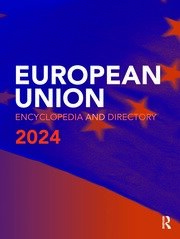European Union Encyclopedia and Directory 2024
Edited By Europa Publications
24th Edition -Copyright 2023 – Routledge / Taylor & Francis

European Union Energy Policy at a Time of Crisis
John Szabó
Introduction
Following the Russian Federation’s large-scale invasion on 24 February 2022, Ukraine remains at war, with its territorial integrity and political autonomy at stake. The Russian invasion of its neighbour has claimed the lives of tens of thousands of people and disrupted international relations to an extent that has effectively reshaped the international political and economic order. The European Union (EU) is close to the epicentre of events, because, although its citizens may not have had to risk their lives in conflict, its member states have offered political support, provided weaponry and imposed sanctions of various sorts on Russia. The repercussions of these actions are substantive, and nowhere more so than in the energy sector. EU member states are attempting to tackle the Herculean task of ending their dependence on fossil fuels from Russia, historically their largest energy supplier, to reduce its energy revenues and thereby limit its ability to finance the ongoing conflict. Moving away from this reliance is an exceptionally challenging prospect, given the turbulence of the energy crisis that predated the invasion. However, the EU has been developing a climate action framework for many years, establishing a solid foundation for the necessary shift. Hitherto, however, it pursued the energy transition at a relatively relaxed pace, with actors in positions of power frequently impeding efforts to reconfigure the energy system and, with it, respective power relations. Nevertheless, this had begun to change, as it had become increasingly clear that a reliance on (imported) fossil fuels was neither desirable nor tenable. This essay surveys the EU’s energy policy responses to the war in Ukraine during the roughly six-month period from the outbreak of the conflict until August 2022, by exploring the energy- and climate-related context of recent events.


